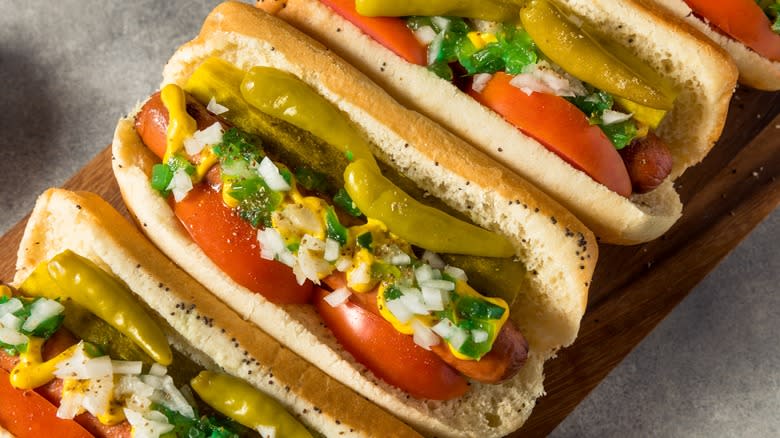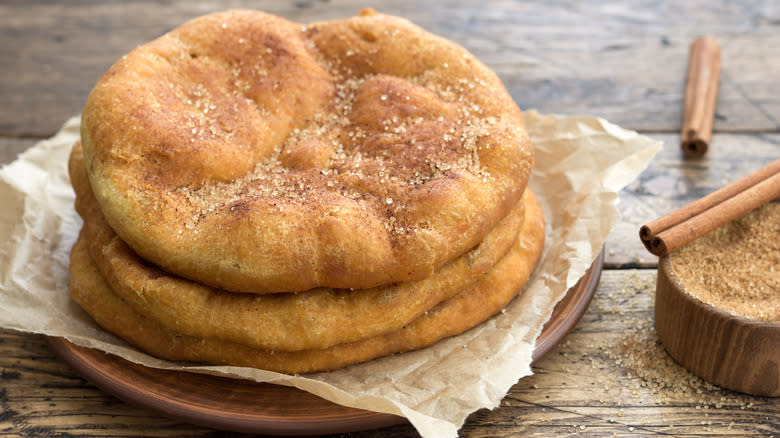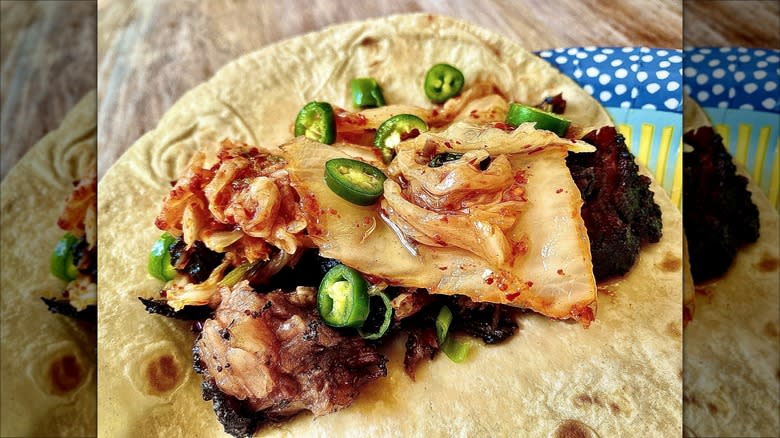The World Doesn't Seem To Understand What American Food Really Is

To a lot of people from other countries, the idea that American food belongs in the same class as the great cuisines of the world -- Italian, French, Japanese, Mexican, and so forth -- is abject blasphemy. (It's not just Europeans, but they seem overrepresented here.) American food? Isn't that just McDonald's and KFC? The sentiment seems like it runs along illogical lines: "Dumb Americans with unhealthy fried foods; they can't possibly compete with the culinary creative genius that provided us with ortolan or the toast sandwich." Others, in particular, seem to believe the only type of cheese we have here is Kraft singles -- as if your average Kroger cheese aisle in rural America doesn't feature a selection that would drive Chester Cheetah to go lie down until the room stopped spinning.
The confusion over American food is understandable. But non-Americans who believe American food is just fast food simply do not understand what it is, nor do they care to try it. These same people often wrongly insist America doesn't have a culture, even though the U.S. is clearly dozens of cultures stacked on top of each other in a trench coat. (Which, to wit, is how you get a country that can produce both the Chicago-style hot dog and jambalaya.) In fact, therein lies the secret of what makes American cuisine so special.
Read more: The 101 Best Pizzas In America
Sometimes Critics Forget The Actual Origins Of American Food

The biggest problem with declaring that American cuisine is "just burgers" is it ignores the galactic-sized culinary contributions made by Native Americans and how they impacted food on a gargantuan, global scale. Corn, tomatoes, peppers, pumpkins, turkey, peanuts, and potatoes are all foods that are now integral to myriad cuisines on a worldwide scale; every last one of them came from the Americas and were first domesticated by indigenous peoples. Depending on who you ask, it might be less common for a specific dish created by North American Indigenous peoples to make it into the broader modern American culinary lexicon (though it does happen, as in the case of popcorn), but to deny their influence is to erase a titanic culinary legacy. And there are indeed popular Native American foods prevalent in areas of the U.S. regardless -- fry bread, anyone?
But therein lies the problem. To many outside the U.S., "America" is only white, Anglo-Saxon America. Given the long history of colonialism and its refusal to acknowledge the validity of Indigenous peoples, it's perhaps unsurprising that they do this with non-white aspects of American culture and cuisine, but they'll even do it to other European-influenced foods. Watching someone deny that New Orleans cuisine -- probably the jewel in America's culinary crown, a magnificent melding of Afro-Caribbean, Native American, and French influences -- is American "because New Orleans was a French colony" boggles the mind. The irony is the blending of culinary influences they deride is far more emblematic of the best parts of American food than McDonald's.
Americans Edit And Refine Food With A Passion

While a lot of other cuisines are tied to "that's just how it's done" dogma, Americans, at least food-wise, have two culinary superpowers: fusion and editing. Because our history is shorter than most countries and we're not as dogmatically tied to tradition, Americans (particularly those in more marginalized communities) are often the only ones creative enough to think something like, "Hey, what if we combined Vietnamese food with hot dogs?"
We might not be the only ones to try out fusion (for instance, the U.K.'s classic fish and chips have some pretty significant Jewish roots), but Americans tend to go at the idea hard. We've created foods like sushi rolls (California rolls, unsurprisingly, aren't a thing in Japan), Tex-Mex, and American Chinese food, let alone the 2010s' trend towards new fusions.
Editing is more subtle, but possibly even more important: nobody can take an existing food and make it better like Americans. We didn't invent the hamburger, but we edited it into something far greater than its original form since the original version of the hamburger wasn't served on a bun and resembled Salisbury steak more than anything else. The same phenomenon has happened with plenty of other foods -- notably pizza, whose original Neapolitan form is eaten with a knife and fork and only nominally resembles what you'll find in an American pizzeria.
American Food Is A Sum Of Its Parts

It should therefore go without saying that American food is also far more than hamburgers, fried chicken, and pizza. The Reuben sandwich, king of all sandwichdom, was invented in Omaha. Spam musubi, the signature dish of Hawaii, was probably created as a result of the prevalence of canned U.S. military meat products in Hawaii during World War II. A bagel with lox and cream cheese is probably the other iconic New York dish alongside pizza, and it was invented in the Big Apple in the early 20th century.
There are also dozens of lesser-known but brilliant American regional dishes. Ever heard of crab pretzels? They're soft pretzels topped with crab dip and cheese and baked, and they are sold absolutely everywhere in Maryland (even at the Maryland Ren Faire). However delicious you think they are, trust that they will exceed your expectations. Conch fritters, a legendary food of Key West, is by all accounts the best seafood item you've probably never eaten. Taylor ham is one of many signature New Jersey eats, but don't hold that against the Garden State -- it's delicious.
This goes back to the lack of one unified American culture. America is a wildly varied country, with dozens of cultures and subcultures stacked on top of each other, and since food is culture, culinary diversity is only inevitable. Combine that with our proclivity for fusion cuisine and you wind up with creations unlike anything anywhere else in the world.
American Food Is Improvisational In A Way Other Cuisines Often Aren't

Our abilities to harness fusion and editing within the culinary sphere make it clear: America is able to take influences from every other possible global source and use them to create something wholly new and unexpected. Just because our cuisine hasn't remained largely unchanged for hundreds of years doesn't mean it's somehow lesser than a recipe eaten by King So-and-So XVI at his coronation feast centuries ago. People from other countries often seem either unwilling or unable to understand that America's penchant for trying something wholly new and unexpected is what makes our food great.
American food creativity isn't slowing down, either. The more recent rise in popularity of Korean food in the U.S. has led to some truly interesting ideas, including Roy Choi's efforts to combine Korean and Mexican food with Korean BBQ tacos. Vietnamese and Cajun cuisine is another natural combo, considering both areas have histories of French colonialism. And more and more restaurants are embracing "chaos cooking," with menus containing dishes from a variety of cuisines.
American food is experimentation, it is boundary-breaking, it is culinary jazz. It pushes the very frontiers of what's possible to do in a kitchen. Does it always work? Of course not, Cincinnati chili exists, so yeah, sometimes we're so preoccupied with whether or not we could that don't stop to think about whether we should. (Only joking, Cincinnati! You do you.) But we'll never stop trying, even if the world doesn't want to understand that's what makes it great.
Read the original article on Daily Meal.

